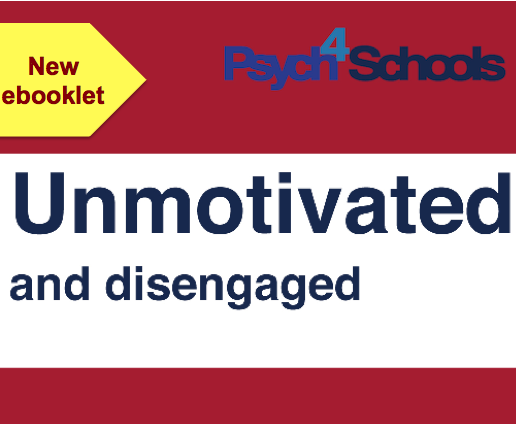
New release: Working with children who are disengaged and unmotivated in the classroom
November 13, 2016

Did you know that up to 20 per cent of students in any year are described as disengaged? [1]Angus, M., McDonald, T., Ormond, C., Rybarcyk, R., Taylor, A., & Winterton, A. (2009). Trajectories of classroom behaviour and academic … Continue reading This impacts significantly of the student’s learning outcomes. Many do not catch up academically in later years. [2] Angus, M., McDonald, T., Ormond, C., Rybarcyk, R., Taylor, A., & Winterton, A. (2009). Trajectories of classroom behaviour and academic … Continue reading
Today we release our newest ebooklet ‘Working with children who are disengaged and unmotivated in the classroom. This new ebooklet contains content that will raise your general awareness about promoting and managing student motivation and engagement, and ways of responding to students who lack motivation. This will assist you to fine-tune and select appropriate strategies for individual children and specific situations. Strategies can also be easily adapted to be included in student’s Individual Learning Plans and the recommendations section of psychologist’s reports. The strategies outlined in the ebooklet are designed for use with students in primary and junior secondary schools, but can easily be adapted for students in the senior years.
The ebooklet includes recommendations on how to help:
- Preliminary strategies
- Talk to previous teachers and review attendance data
- Talk to parents
- Build your capacity as a teacher
- Whole-class strategies
- How do you present as a teacher?
- Build strong trusting relationships
- create a well-resourced classroom
- Structure your lessons to increase engagement
- Check that students understand the task
- Empower students to have greater ownership of learning
- Ensure that homework and assignments are fair and accessible
- Use a variety of teaching styles
- Effectively manage low-level disruptive behaviours
- Whole-school strategies
- Build a culture of learning and engagement
- Additional strategies
- Investigate possible reasons for lack of motivation
- Build self-belief and persistence
- Build social skills if the child has friendship difficulties
- Resources
- Appendix 1: What to do if you find it difficult to like a particular child
How do I access the ebooklet?
The ebooklet is available to Psych4Schools members for free in the members section. Non-members can read an excerpt of the ebooklet in our free resources section, and can purchase a copy of the ebooklet in the shop. Not a member? Join today to access this new ebooklet and all our other ebooklets, resources, screening tools and worksheets.
References